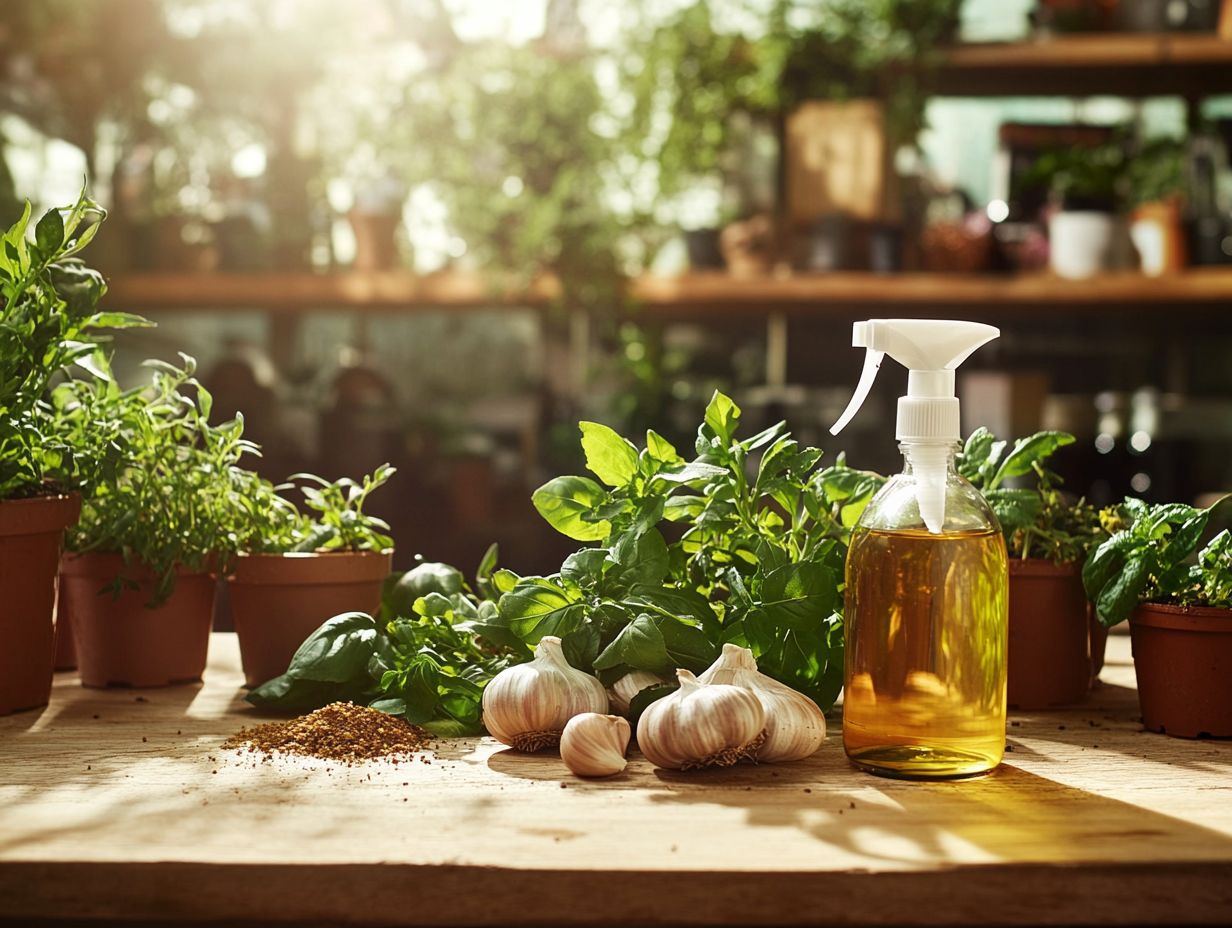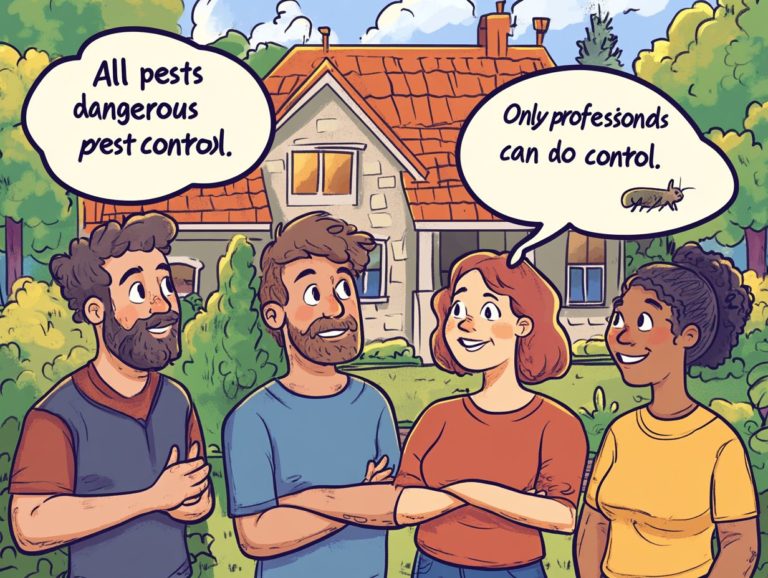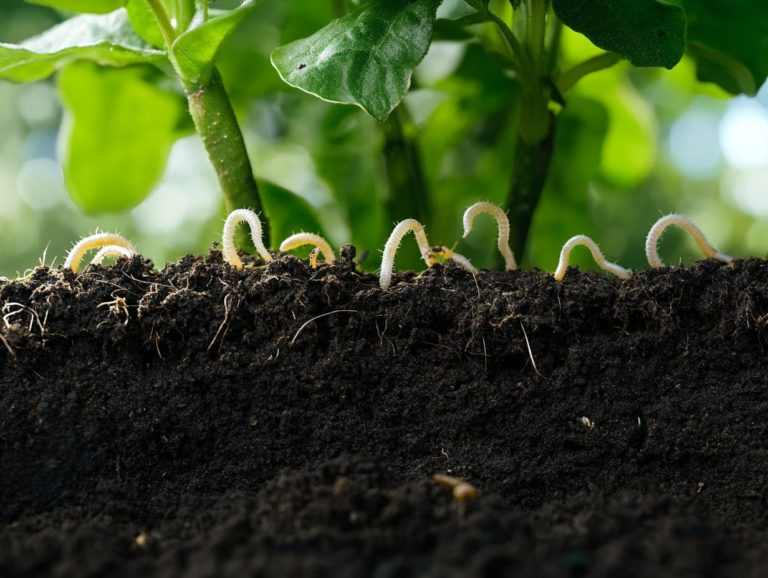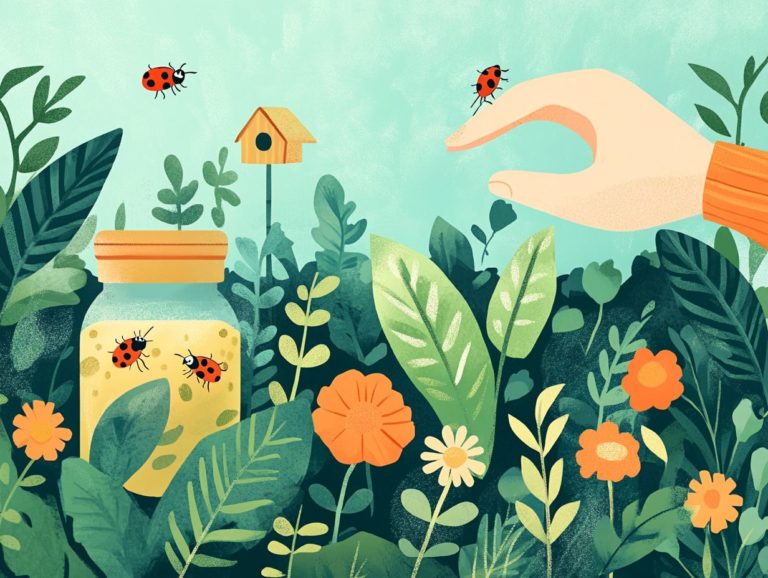5 Effective Organic Pesticides You Can Make
Are you seeking natural methods to safeguard your garden without relying on harsh chemicals? You ve found the perfect resource.
This article delves into five highly effective organic pesticides that you can effortlessly whip up at home, featuring options like garlic and onion spray, neem oil spray, and others.
It covers what organic pesticides are, their benefits and drawbacks, how to create them, and essential tips for safe and effective application.
Get ready to enhance your gardening experience! You ll keep it eco-friendly and your plants thriving!
Contents
- Discover Your Key Takeaways:
- 1. Garlic and Onion Spray
- 2. Neem Oil Spray
- 3. Tomato Leaf Spray
- 4. Chrysanthemum Tea Spray
- 5. Eucalyptus Oil Spray
- What Are Organic Pesticides and Why Use Them?
- Frequently Asked Questions
- What are some effective organic pesticides that I can make at home?
- Why should I use organic pesticides instead of traditional chemical ones?
- How do I make garlic spray for pest control?
- Can I use neem oil spray on all types of plants?
- How does vinegar spray work as a pesticide?
- Are there any potential downsides to using homemade organic pesticides?
Discover Your Key Takeaways:

- Organic pesticides made from natural ingredients such as garlic, onion, neem oil, tomato leaf, chrysanthemum tea, vegetable oil, and eucalyptus oil are safe, effective, and easy to make at home.
- Using organic pesticides reduces the risk of harmful chemicals in produce and promotes a healthier environment, thereby encouraging pest management strategies that are eco-friendly.
- Proper application and precautions, such as wearing protective gear and avoiding contact with beneficial insects, are crucial for effective and safe use of organic pesticides.
1. Garlic and Onion Spray
Garlic and onion spray is your secret weapon for a powerful homemade insect repellent, harnessing the natural compounds in these ingredients to keep a range of pests at bay.
This straightforward yet effective organic pesticide is perfect for both outdoor gardens and indoor plants. It works in harmony with beneficial insects like lady beetles while keeping harmful pests such as cutworms and tomato foes under control. Incorporating 5 herbs that naturally repel pests can further enhance your pest management efforts.
To whip up this spray, combine approximately 1 bulb of garlic and 1 medium onion with 1 quart of water. Blend them thoroughly and strain the mixture to rid it of any solid bits.
Once you have your concoction ready, you ll find that its pungent aroma effectively deters unwelcome guests like aphids and whiteflies.
For the best results, apply the spray using a fine mist early in the morning or late in the afternoon. This timing allows the natural repellents to take effect without the intense sun breaking them down.
Plus, this method is friendly to helpful insects that feast on the harmful ones, making it a key part of your pest management strategy.
2. Neem Oil Spray
Neem oil spray stands out as a top natural pesticide, renowned for its effectiveness against a variety of insect pests. It’s an essential part of your organic pest control arsenal.
With its unique properties, neem oil disrupts the insect life cycle and helps maintain a harmonious garden ecosystem, safeguarding beneficial insects like pollinators and lady beetles.
To prepare your neem oil spray, start by mixing two tablespoons of neem oil with a gallon of water, adding a few drops of liquid soap to ensure the oil blends seamlessly.
Once you’ve mixed it thoroughly, you can spray this solution directly onto the affected plants.
Unlike traditional pesticides, which can pose risks to a wide range of organisms, this natural option zeroes in on troublesome pests such as the squash vine borer and carrot fly. It effectively interrupts their reproductive processes and minimizes their detrimental effects on your garden.
When woven into a comprehensive pest management strategy, neem oil also keeps pests at bay and fosters a healthier garden environment.
Try making these sprays today and watch your garden thrive!
You ve got this! Your garden will flourish without harsh chemicals!
3. Tomato Leaf Spray
Tomato leaf spray is an innovative homemade insecticide that harnesses the natural compounds found in tomato leaves to effectively repel common garden pests, especially the notorious tomato hornworm. This organic pesticide elevates your pest management practices and aligns perfectly with eco-friendly gardening methods, allowing you to cultivate a healthy garden environment.
To create this powerful spray, start by gathering fresh tomato leaves. Steep them in boiling water for about 20 to 30 minutes. Once the mixture has cooled, strain the liquid to remove the leaf material, ensuring you have a concentrated solution.
Dilution is key! Mix one part of this concentrated solution with ten parts of water for optimal effectiveness. This spray specifically targets pests like aphids and whiteflies, making it a versatile addition to your gardening toolkit.
Integrate it into a holistic pest control strategy, alongside other organic methods like neem oil or companion planting. Doing so enhances your defense against infestations while promoting biodiversity in your garden.
4. Chrysanthemum Tea Spray

Chrysanthemum tea spray is a hidden gem in the world of organic pesticides, crafted from the vibrant flowers of the chrysanthemum plant. Its natural insecticidal properties make it an effective ally against various insect pests, perfectly aligning with your commitment to non-chemical pest management! This eco-friendly solution can play a pivotal role in your holistic approach to pest control, ensuring your garden thrives.
To whip up this potent spray, steep dried chrysanthemum flowers in hot water for around 30 minutes, allowing the natural pyrethrins to infuse beautifully. Once strained, dilute the tea with water for easy application. When facing off against pesky aphids and spider mites, simply spritz the solution directly onto the affected plants, covering both the upper and lower surfaces of the leaves thoroughly.
Incorporating this spray into your gardening routine, alongside practices like companion planting where you grow beneficial plants together and using organic amendments, will elevate its effectiveness. This approach fosters a balanced ecosystem that deters common pests and promotes the overall health of your plants!
5. Eucalyptus Oil Spray
Eucalyptus oil spray serves as a powerful organic pesticide, utilizing the natural repellent properties of eucalyptus to fend off a variety of insect pests. It s an excellent choice for both your indoor plants and outdoor gardens. This natural insecticide protects your plants and keeps your garden thriving by minimizing your reliance on chemical treatments and enhancing your pest management strategies!
To whip up an effective eucalyptus oil spray, mix 2 tablespoons of eucalyptus essential oil with 4 cups of water. Add a few drops of mild liquid soap to help the oil mix well. Blend the mixture thoroughly and pour it into a spray bottle for effortless application. Target areas where pests like to gather, such as the undersides of leaves, and remember to reapply every week or after rain.
This potent spray can effectively tackle common pests, including:
- Mosquitoes
- Aphids
- Spider mites
By combining eucalyptus oil spray with homemade insecticides like garlic spray and hot pepper spray, you can create a formidable barrier that offers comprehensive protection against a broader spectrum of insects, enhancing the overall health of your garden!
What Are Organic Pesticides and Why Use Them?
Organic pesticides are your eco-friendly allies, crafted to manage pesky insects while nurturing a healthy garden ecosystem using natural ingredients and sustainable practices. They not only keep harmful insect populations in check but also safeguard beneficial insects, ensuring a balanced environment that enhances biodiversity and improves the quality of your crops.
By choosing organic pesticides, you can adopt an overall strategy to pest management that prioritizes soil health and minimizes the risk of chemical runoff into local waterways. For instance, incorporating 5 simple pest control hacks for gardeners such as neem oil, diatomaceous earth, and insecticidal soaps effectively target pests while keeping negative impacts on the surrounding environment to a minimum.
Organic pesticides keep beneficial insects thriving in your garden! This long-term strategy fosters sustainable gardening practices, reducing your reliance on synthetic chemicals and cultivating healthier ecosystems.
Ultimately, embracing organic pest control measures not only benefits your garden but also contributes to the overall health of the environment, promoting a sustainable pest management approach.
What Are the Benefits of Using Organic Pesticides?
Using organic pesticides presents a wealth of advantages for you and your garden. Not only do they preserve beneficial insects, but they also enhance soil quality and promote healthy, sustainable pest control methods. These eco-friendly alternatives minimize chemical exposure for both you and wildlife, contributing to a balanced garden ecosystem.
By fostering biodiversity, you allow various species to thrive, creating a more resilient environment. Unlike synthetic options that can endanger non-target organisms, organic solutions are generally safe for pets and humans, thereby reducing the risks associated with chemical residues.
You can easily incorporate organic pesticides into your gardening routine alongside other practices, such as companion planting, where certain plants naturally repel pests and further enhance garden health.
For effective pest control, consider these steps:
- Regularly monitor plant health.
- Apply organic solutions at the first sign of infestation.
- Encourage natural predators, like ladybugs and birds, to help maintain that delicate balance in your garden ecosystem.
What Are the Drawbacks of Using Organic Pesticides?

While organic pesticides serve as a valuable tool in your pest management arsenal, they do come with some drawbacks. Their action may be slower compared to chemical alternatives and may not be as effective against severe infestations. Understanding these limitations is essential for you as a gardener aiming to balance pest control strategies effectively.
One common challenge you may face when using organic options is the need for frequent applications. Because these substances have a shorter effect, act quickly and apply them at the first sign of pests! This can lead to increased labor and costs, especially if pests make a swift return after treatment.
<pSome organic pesticides may not target specific pests effectively, making them less useful in particular scenarios. To tackle these challenges, it s vital for you to accurately identify the pests before applying any treatment.
Incorporating integrated pest management strategies a method of controlling pests by using a combination of different strategies such as monitoring pest populations, promoting beneficial insect species, and rotating treatments, can significantly enhance the efficacy of organic pesticides while minimizing your reliance on them.
How Can These Pesticides Be Made at Home?
Make your own organic pesticides and watch your garden thrive! Creating homemade organic pesticides is cost-effective and sustainable for managing pesky insect invaders, especially when you follow 5 essential steps for organic pest prevention.
By using common household ingredients, you can formulate effective pest control solutions safe for your garden and the environment. For instance, consider incorporating elements like garlic, cayenne pepper, and vegetable oil to craft natural insecticides tailored to specific pest problems, or explore 5 effective traps for common garden pests to enhance your pest management strategy.
These natural ingredients do double duty they repel unwanted pests and help reduce reliance on synthetic chemicals that can harm beneficial insects and disrupt soil health.
Gather fresh garlic. It s a powerful insect repellent. Mix it with water and a few drops of liquid soap to create a potent spray.
If you re dealing with soft-bodied nuisances like aphids, combine cayenne pepper with water for remarkable results.
When it’s time to apply these solutions, remember to spray during the early morning or late evening. This minimizes evaporation and ensures better adherence to plant surfaces.
By integrating these homemade remedies into a wider overall pest control plan, you can boost your garden s health and promote a balanced ecosystem while effectively keeping pests at bay.
What Are the Steps to Using These Pesticides Effectively?
To use organic pesticides effectively, adhere to a structured pest management plan that includes proper timing, application methods, and diligent monitoring of insect populations. This meticulous strategy ensures successful pest control while protecting beneficial insects.
Understanding the right moments to apply these treatments is vital. For instance, treating early in the morning or late in the evening helps reduce exposure to beneficial insects while maximizing effectiveness against pests.
Regularly check on pest populations to adjust application frequency based on activity levels you observe. Utilize techniques such as targeted sprays, drenching solutions, or even physical barriers to address specific pest challenges.
Incorporate companion planting to enhance pest control and encourage natural predators to further bolster your pest management efforts, creating a balanced and harmonious garden environment.
Are There Any Precautions to Take When Using Organic Pesticides?
While organic pesticides are generally viewed as safer alternatives to chemical ones, it s essential to take specific precautions to ensure both safety and effectiveness in pest management.
Proper insect identification and strict adherence to application guidelines help you prevent unintended harm to beneficial insects and maintain a balanced garden ecosystem.
Equip yourself with protective gear like gloves and masks to minimize exposure and safeguard your health. Keep pets away from treated areas to prevent accidental ingestion or contact.
Applying organic pesticides during calm weather can significantly reduce drift and limit environmental impact. By understanding the specific needs of your plants and their susceptibility to pests, you can select the most suitable organic methods tailored to your garden.
This knowledge will enhance the effectiveness of your pest control efforts while contributing to the overall health and vitality of your plants.
Frequently Asked Questions

What are some effective organic pesticides that I can make at home?
There are several options for effective organic pesticides, including garlic spray, neem oil spray, and vinegar spray. For more information, consider exploring the top 5 natural pest deterrents for your garden. Neem oil is derived from the seeds of the neem tree, known for its insect-repelling properties.
Why should I use organic pesticides instead of traditional chemical ones?
Organic pesticides are a safer and more environmentally friendly option for controlling pests. They do not harm beneficial insects and are less likely to cause harm to humans and pets.
How do I make garlic spray for pest control?
To create garlic spray, mix minced garlic with water. Add a small amount of liquid soap.
Let the mixture sit for 24 hours. Then strain it and add more water before spraying it on your plants.
Can I use neem oil spray on all types of plants?
Yes, neem oil spray is safe for all plants, including fruits, vegetables, and ornamentals. It’s wise to test a small area first to check for any negative effects.
How does vinegar spray work as a pesticide?
Vinegar spray disrupts insect cell membranes, causing dehydration and death. It’s especially effective against soft-bodied pests like aphids and mites.
Are there any potential downsides to using homemade organic pesticides?
Keep in mind that homemade organic pesticides might not be as strong as store-bought ones. However, considering 5 reasons to choose organic pest management, you may need to apply them more often to keep pests at bay.






